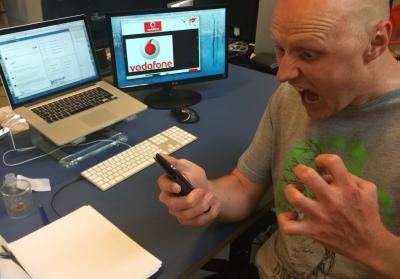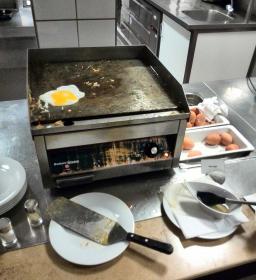Helping organisations and individuals organise and improve their communication processes through analysis, project management, mediation and training.
Blog (Tag: Service)
What’s the most important thing for any business? Customers! Everyone knows that right? Sometimes you’re about to “be a customer”, and you know you’re in for a treat. And often you’re not disappointed. Then there are the times when you just know you’re in trouble and this will not be a pleasant experience, yet you still go ahead, and unfortunately, you’re usually right.
The internet is full of complaints and rants about bad service, but it seems people don’t focus on the good. That’s why I’d like to start with two examples of excellent service. The first is Amazon. For a huge internet sales company, their customer service is remarkable. Here’s an example: (one of many I have)
I ordered a mobile charger for my holiday in South Africa, and received it perfectly on time. Unfortunately half-way through my holiday, it broke. So on New Years’ Day (A holiday mind you), I contacted Amazon through their chat support, and explained my problem. Without needing any proof, without asking complicated questions such as “Did you drop it?” or “Could it have come into contact with water?” they said they would refund it. The next day I had the money back in my account to buy a new one.
But of course there’s also the bad experiences such as mine with a certain phone company...
Very often these culprits are mobile phone or internet providers. People often say it’s because of the size of the company and because you’re “just a number” but that’s no different from Amazon (Amazon: $75bn revenue, Vodafone: $72bn revenue). I’m obviously going to use my mobile phone experience as a bad example. The short version is that I was wrongly informed by an employee of Vodafone that I deserved a 4G phone as a replacement, and not 3G, since it’s otherwise not “comparable”. So they sent me a new phone, and when it arrived, the courier (A Vodafone employee) advised me to refuse the package, since the phone was the same as I already had, not solving my problem. So I refused the package, and suddenly received a €50 addition to my phone bill. Vodafone refuses to credit this €50.
So it seems that to a company such as Vodafone, €50 euros extra revenue is more important than a satisfied customer. And that baffles me. In this day and age of internet and social media, how can companies sill not understand how important it is to keep customers happy.
The formula is quite simple:
- Find customers with honest marketing.
- Keep the customers happy by exceeding their expectations.
- When they have a problem, HELP THEM. Assume they are right when there is a dispute, do not assume it’s their fault.
- Give your customers the tools to promote for you. This works if they have good service.
Of course this is no definitive list, but simple tips any company can follow. And it all comes down to communication. Do you teach your operators that they should save the company money, or do you train them to keep customers happy? What would you want as a customer?
Remember, without your customers, you have NO INCOME.
[Update] After sending an official written complaint, I was called by a Vodafone representative (a very polite and understanding gentleman) and told that the full amount of the extra costs will be credited on my next phone bill. Great that my efforts were not in vain!
I had a breakfast meeting at the Holiday Inn Eindhoven a few days ago, and as one would expect at a 4-star hotel, it was a regular buffet breakfast with the usual foods on offer. As I looked around the breakfast room, I noticed a predominance of business people dressed in suits (few ties nowadays, but suits nonetheless), and about 30% of them having meetings over their morning croissants.
As usual, I started with a plate of fruits and some bread with a regular coffee and some grapefruit juice. There's something about the bitterness of grapefruit juice that just gives me that wake-up kick I need in the morning.
For my second round, I went to get some warm food, so I headed to the egg station. To my surprise, there was a battered old frying plate, a bowl of eggs (labelled 'Raw Eggs'), a bowl of egg shells, a (industrial) spatula, a brush with oil and a small salt & pepper set. I was expected to fry my own egg. Really. The picture shows this intricate arrangement of the items.
Now I'm not saying that I'm incapable of frying my own egg, or even that I don't enjoy it. But did I expect to at a 4-star hotel? No.
So why did they decide to do this, and is it a good idea? Here's what I think.
I'll give Holiday Inn the benefit of the doubt, and say that they are probably trying to jump on the 'experience' bandwagon. Having their guests interact with the product more, might give them a stronger emotional bond with it, allows them to have their product personalised, and then eventually come back for more... or that's the idea. It's either that, or they are trying to save on labour costs.
Now I can see this working in a different type of hotel. Perhaps a leisure hotel in a relaxed setting where you have all the time in the world. I can see the frying plate being designed in such a way that it fits neatly into the inviting decor of the breakfast buffet. Perhaps a few bowls of spices and herbs that you can use to season your egg, and maybe a sign "Feel free to fry your own egg, so it can be exactly the way you like it." I can even imagine small shapes you can use to make interesting eggs for the kids or loved ones.
But in a business hotel? I don't think so. Most of your guests are wearing suits, and are off to a meeting. None of them want oil stains on their shirts. Many of these guests are having meetings at the tables. Do they really want to stand behind the egg station for 10 minutes? Half of them wouldn't even want to touch the spatula, because that's already covered in oil. And there are no napkins or cloths around to get the inevitable raw egg off your hands.
So come on Holiday Inn, I advise you to re-think your idea here, and maybe ask your guests what they want.


